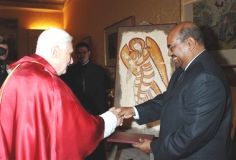Sudan’s Beshir offers Darfur ceasefire, blasts rebels
September 14, 2007 (ROME) — Sudanese President Omar al-Beshir said Friday he was ready to call a ceasefire in the war-torn province of Darfur ahead of October peace talks while accusing rebels of prolonging the conflict.
 “We think a number of factions are not ready for peace. They are enjoying their stay in luxurious hotels in Europe,” Beshir told an evening news conference in Rome. “We can say they are marketing the suffering of their people in Darfur.”
“We think a number of factions are not ready for peace. They are enjoying their stay in luxurious hotels in Europe,” Beshir told an evening news conference in Rome. “We can say they are marketing the suffering of their people in Darfur.”
Beshir made the ceasefire offer ahead of his first meeting with Pope Benedict XVI, who voiced his “heartfelt hope” for the success of the peace talks, the Vatican said.
“We stated that we are prepared for a ceasefire for the start of negotiations in order to create a positive climate conducive to a positive end to the negotiations,” Beshir said after talks with Italian Prime Minister Romano Prodi.
The Sudanese government and Darfur rebels who refused to sign a peace agreement are to hold talks in Tripoli from October 27.
Several ceasefires have already broken down. But last month, UN and African Union mediators brokered talks in Tanzania between the myriad rebel factions to thrash out a common platform for new talks with the government.
The African Union mission in Sudan said only on Tuesday, however, that it was deeply concerned about renewed fighting.
Beshir faces mounting international pressure over the Darfur conflict, which has killed at least 200,000 people and displaced two million since 2003, according to UN figures.
The Sudanese leader stated Friday that 350,000 internally displaced people “have returned voluntarily to their homes and villages.”
The conflict, which the United States has called “genocide”, started after Beshir’s government enlisted Janjaweed Arab militia allies to help put down an ethnic minority rebellion.
The Sudanese president said he asked Prodi to pressure “certain European countries harbouring some of these rebel groups” to persuade them to come to the negotiating table.
“Every day we see a new faction, more splintering, even a group riding only three cars,” Beshir said, adding: “I would like to declare the coming negotiations will be final … Any party (not honouring it) should be subject to punishment.”
During Beshir’s audience with Benedict at the papal residence at Castel Gandolfo near Rome late Friday morning, the Vatican said “very positive views were expressed concerning fresh peace negotiations for Darfur.”
A Vatican communique said: “It is the Holy See’s heartfelt hope that these negotiations prove successful in order to put an end to the suffering and insecurity of those peoples.”
For his part, Prodi called on Beshir’s government to make “realistic contributions” to the October negotiations. He pledged financial help, transport and logistical assistance, as well as training for a UN peacekeeping force to be deployed in Darfur.
Also Friday, the US group Human Rights Watch urged both Prodi and the pope to call for the arrest of International Criminal Court (ICC) suspects including Sudan’s State Minister for Humanitarian Affairs Ahmed Haroun.
The ICC issued an arrest warrant for Haroun in April citing 42 counts of crimes against humanity and war crimes. The court highlighted evidence that Haroun recruited, paid and armed Janjaweed accused of raping and killing civilians in Darfur in 2003 and 2004.
Haroun is now in charge of hearing human rights complaints from Darfur abuse victims.
“Nominating a suspected war criminal to hear human rights complaints from Darfur’s victims is outrageous and shows the government’s utter disregard for their plight,” said Lotte Leicht, EU advocacy director at Human Rights Watch.
But Beshir told the evening news conference: “This issue is not our business. We don’t have anything to do with this court, so we’re not going to waste our time answering questions about it. We are not part of the Rome protocol.”
Beshir, who came to power in an Islamist-backed coup in 1989, was also set to meet his Italian counterpart Giorgio Napolitano and the ministers of economic development and transport, Luigi Bersani and Alessandro Bianchi, during a three-day visit.
(AFP)
